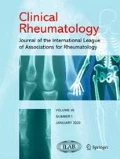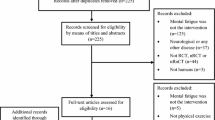Abstract
In various chronic pain populations, decreased cognitive performance is known to be related to pain severity. Yet, this relationship has not been investigated in patients with chronic fatigue syndrome (CFS). This study investigated the relationship between cognitive performance and (1) pain severity, (2) level of fatigue, and (3) self-reported symptoms and health status in women with CFS. Examining the latter relationships is important for clinical practice, since people with CFS are often suspected to exaggerate their symptoms. A sample of 29 female CFS patients and 17 healthy controls aged 18 to 45 years filled out three questionnaires (Medical Outcomes Study 36-Item Short-Form Health Survey, Checklist Individual Strength (CIS), and CFS Symptom List) and performed three performance-based cognitive tests (psychomotor vigilance task, Stroop task, and operation span task), respectively. In both groups, pain severity was not associated with cognitive performance. In CFS patients, the level of fatigue measured with the CFS Symptom List, but not with the CIS, was significantly correlated with sustained attention. Self-reported mental health was negatively correlated with all investigated cognitive domains in the CFS group. These results provide evidence for the clinical importance of objectively measured cognitive problems in female CFS patients. Furthermore, a state-like measure (CFS Symptom List) appears to be superior over a trait-like measure (CIS) in representing cognitive fatigue in people with CFS. Finally, the lack of a significant relationship between cognitive performance and self-reported pain severity suggests that pain in CFS might be unique.
Similar content being viewed by others
References
Fukuda K, Straus SE, Hickie I, Sharpe MC, Dobbins JG, Komaroff A (1994) The chronic fatigue syndrome: a comprehensive approach to its definition and study. International Chronic Fatigue Syndrome Study Group Annals of internal medicine 121(12):953–959
Christley Y, Duffy T, Martin CR (2012) A review of the definitional criteria for chronic fatigue syndrome. J Eval Clin Pract 18(1):25–31. doi:10.1111/j.1365-2753.2010.01512.x
Cockshell SJ, Mathias JL (2010) Cognitive functioning in chronic fatigue syndrome: a meta-analysis. Psychol Med 40(8):1253–1267. doi:10.1017/S0033291709992054
Ickmans K, Clarys P, Nijs J, Meeus M, Aerenhouts D, Zinzen E, Aelbrecht S, Meersdom G, Lambrecht L, Pattyn N (2013) Association between cognitive performance, physical fitness and physical activity level in women with chronic fatigue syndrome. J Rehabil Res Dev (in press)
Jason LA, Richman JA, Rademaker AW, Jordan KM, Plioplys AV, Taylor RR, McCready W, Huang CF, Plioplys S (1999) A community-based study of chronic fatigue syndrome. Arch Intern Med 159(18):2129–2137
DeLuca J, Johnson SK, Beldowicz D, Natelson BH (1995) Neuropsychological impairments in chronic fatigue syndrome, multiple sclerosis, and depression. J Neurol Neurosurg Psychiatry 58(1):38–43
McDonald E, Cope H, David A (1993) Cognitive impairment in patients with chronic fatigue: a preliminary study. J Neurol Neurosurg Psychiatry 56(7):812–815
Vercoulen JH, Bazelmans E, Swanink CM, Galama JM, Fennis JF, van der Meer JW, Bleijenberg G (1998) Evaluating neuropsychological impairment in chronic fatigue syndrome. J Clin Exp Neuropsychol 20(2):144–156
Grafman J, Schwartz V, Dale JK, Scheffers M, Houser C, Straus SE (1993) Analysis of neuropsychological functioning in patients with chronic fatigue syndrome. J Neurol Neurosurg Psychiatry 56(6):684–689
Short K, McCabe M, Tooley G (2002) Cognitive functioning in chronic fatigue syndrome and the role of depression, anxiety, and fatigue. J Psychosom Res 52(6):475–483
Joyce E, Blumenthal S, Wessely S (1996) Memory, attention, and executive function in chronic fatigue syndrome. J Neurol Neurosurg Psychiatry 60(5):495–503
Capuron L, Welberg L, Heim C, Wagner D, Solomon L, Papanicolaou DA, Craddock RC, Miller AH, Reeves WC (2006) Cognitive dysfunction relates to subjective report of mental fatigue in patients with chronic fatigue syndrome. Neuropsychopharmacology 31(8):1777–1784
Buchwald D (1996) Fibromyalgia and chronic fatigue syndrome: similarities and differences. Rheum Dis Clin N Am 22(2):219–243
Goldenberg DL, Simms RW, Geiger A, Komaroff AL (1990) High frequency of fibromyalgia in patients with chronic fatigue seen in a primary care practice. Arthritis Rheum 33(3):381–387
Meeus M, Nijs J, Huybrechts S, Truijen S (2010) Evidence for generalized hyperalgesia in chronic fatigue syndrome: a case control study. Clin Rheumatol 29:393–398
Moriarty O, McGuire BE, Finn DP (2011) The effect of pain on cognitive function: a review of clinical and preclinical research. Prog Neurobiol 93(3):385–404. doi:10.1016/j.pneurobio.2011.01.002
De Becker P, Roeykens J, Reynders M, McGregor N, De Meirleir K (2000) Exercise capacity in chronic fatigue syndrome. Arch Intern Med 160(21):3270–3277
Park DC, Glass JM, Minear M, Crofford LJ (2001) Cognitive function in fibromyalgia patients. Arthritis Rheum 44(9):2125–2133. doi:10.1002/1529-0131(200109)44:9<2125::AID-ART365>3.0.CO;2-1
Meeus M, Nijs J, De Meirleir KD (2007) Chronic musculoskeletal pain in patients with the chronic fatigue syndrome: a systematic review. Eur J Pain(London, England) 11(4):377–386
Ware JE Jr, Snow KK, Kosinki M, Gandek B (1993) SF-36 health survey: manual and interpretation guide. The Health Institute, Boston
Ware JE Jr, Sherbourne CD (1992) The MOS 36-item short-form health survey (SF-36). I. Conceptual framework and item selection. Med Care 30(6):473–483
McHorney CA, Ware JE Jr, Raczek AE (1993) The MOS 36-Item Short-Form Health Survey (SF-36): II. Psychometric and clinical tests of validity in measuring physical and mental health constructs. Med Care 31(3):247–263
Wells KB, Stewart A, Hays RD, Burnam MA, Rogers W, Daniels M, Berry S, Greenfield S, Ware J (1989) The functioning and well-being of depressed patients. Results from the Medical Outcomes Study. Jama 262(7):914–919
Haywood KL, Staniszewska S, Chapman S (2012) Quality and acceptability of patient-reported outcome measures used in chronic fatigue syndrome/myalgic encephalomyelitis (CFS/ME): a systematic review. Qual Life Res Int J Qual Life Asp Treat Care Rehab 21(1):35–52. doi:10.1007/s11136-011-9921-8
Vercoulen JH, Swanink CM, Fennis JF, Galama JM, van der Meer JW, Bleijenberg G (1994) Dimensional assessment of chronic fatigue syndrome. J Psychosom Res 38(5):383–392
Vercoulen JH, Alberts M, Bleijenberg G (1999) The Checklist Individual Strength (CIS). Gedragstherapie 32:131–136
Nijs J, De Becker P, De Meirleir K (2003) Gebruik van vragenlijsten bij de kinesitherapeutische evaluatie van patiënten met het chronisch vermoeidheidssyndroom. In: Smets-Engelsman BCM, Vaes P, Verhaegen AP, Scholten-Peeters GGM (eds) Jaarboek Fysiotherapie Kinesitherapie, vol. Bohn Stafleu Van Loghum, Houten/Diegem, pp. 77–107
Nijs J, Aerts A, De Meirleir K (2006) Generalized joint hypermobility is more common in chronic fatigue syndrome than in healthy control subjects. J Manip Physiol Ther 29(1):32–39
Nijs J, Thielemans A (2008) Kinesiophobia and symptomatology in chronic fatigue syndrome: a psychometric study of two questionnaires. Psychology and psychotherapy 81(Pt 3):273–283
Stroop JR (1935) Studies of interference in serial verbal reactions. J Exp Psychol 28:643–662
Dinges DF, Powell JW (1985) Microcomputer analyses of performance on a portable, simple visual RT task during sustained operations. Behav Res Meth Instr 17(6):652–655
Dorrian J, Rogers NL, Dinges DF (2005) Psychomotor vigilance performance: neurocognitive assay sensitive to sleep loss. In: Kushida C (ed) Sleep deprivation: clinical issues, pharmacology and sleep loss effects. Marcel Dekker, New York
Conway ARA, Engle RW (1996) Individual differences in working memory capacity: more evidence for a general capacity theory. Memory 4(6):577–590
Luerding R, Weigand T, Bogdahn U, Schmidt-Wilcke T (2008) Working memory performance is correlated with local brain morphology in the medial frontal and anterior cingulate cortex in fibromyalgia patients: structural correlates of pain-cognition interaction. Brain 131(Pt 12):3222–3231
Weiner DK, Rudy TE, Morrow L, Slaboda J, Lieber S (2006) The relationship between pain, neuropsychological performance, and physical function in community-dwelling older adults with chronic low back pain. Pain medicine (Malden, Mass) 7(1):60–70. doi:10.1111/j.1526-4637.2006.00091.x
Antepohl W, Kiviloog L, Andersson J, Gerdle B (2003) Cognitive impairment in patients with chronic whiplash-associated disorder—a matched control study. NeuroRehabilitation 18(4):307–315
Van Oosterwijck J, Nijs J, Meeus M, Van Loo M, Paul L (2012) Lack of endogenous pain inhibition during exercise in people with chronic whiplash associated disorders: an experimental study. J Pain 13(3):242–254. doi:10.1016/j.jpain.2011.11.006
Oosterman JM, Derksen LC, van Wijck AJ, Veldhuijzen DS, Kessels RP (2011) Memory functions in chronic pain: examining contributions of attention and age to test performance. The Clinical journal of pain 27(1):70–75. doi:10.1097/AJP.0b013e3181f15cf5
Jensen KB, Loitoile R, Kosek E, Petzke F, Carville S, Fransson P, Marcus H, Williams SC, Choy E, Mainguy Y, Vitton O, Gracely RH, Gollub R, Ingvar M, Kong J (2012) Patients with fibromyalgia display less functional connectivity in the brain’s pain inhibitory network. Mol Pain 8:32. doi:10.1186/1744-8069-8-32
Apkarian AV, Hashmi JA, Baliki MN (2011) Pain and the brain: specificity and plasticity of the brain in clinical chronic pain. Pain 152(3 Suppl):S49–S64. doi:10.1016/j.pain.2010.11.010
Meyer RA, Campbell IT, Raja SN (1995) Peripheral neural mechanisms of nociception. In: Wall PD, Melzack R (eds) Textbook of pain, 3rd edn. Churchill Livingstone, Edinburgh, pp 13–44
Meeus M, Nijs J (2007) Central sensitization: a biopsychosocial explanation for chronic widespread pain in patients with fibromyalgia and chronic fatigue syndrome. Clin Rheumatol 26(4):465–473
Meeus M, Nijs J, Van de Wauwer N, Toeback L, Trujen S (2008) Diffuse noxious inhibitory control is delayed in chronic fatigue syndrome: an experimental study. Pain 139(2):439–448
Nijs J, Van Houdenhove B, Oostendorp RA (2010) Recognition of central sensitization in patients with musculoskeletal pain: application of pain neurophysiology in manual therapy practice. Man Ther 15:135–141
de Lange FP, Kalkman JS, Bleijenberg G, Hagoort P, van der Meer JW, Toni I (2005) Gray matter volume reduction in the chronic fatigue syndrome. NeuroImage 26(3):777–781. doi:10.1016/j.neuroimage.2005.02.037
de Lange FP, Koers A, Kalkman JS, Bleijenberg G, Hagoort P, van der Meer JW, Toni I (2008) Increase in prefrontal cortical volume following cognitive behavioural therapy in patients with chronic fatigue syndrome. Brain 131(Pt 8):2172–2180. doi:10.1093/brain/awn140
Okada T, Tanaka M, Kuratsune H, Watanabe Y, Sadato N (2004) Mechanisms underlying fatigue: a voxel-based morphometric study of chronic fatigue syndrome. BMC Neurol 4(1):14. doi:10.1186/1471-2377-4-14
Miller EK, Cohen JD (2001) An integrative theory of prefrontal cortex function. Annu Rev Neurosci 24:167–202. doi:10.1146/annurev.neuro.24.1.167
Lezak MD, Howieson DB, Loring DW (2004) Neuropsychological assessment, 4th edn. Oxford University Press, Inc., New York
Lim J, Dinges DF (2008) Sleep deprivation and vigilant attention. Ann N Y Acad Sci 1129:305–322
Horne JA, Pettitt AN (1985) High incentive effects on vigilance performance during 72 hours of total sleep deprivation. Acta psychologica 58(2):123–139
Acknowledgments
The authors would like to thank Tinne Boey, Martine Sweldens, and Wouter Rosseels for their aid in the data input. Kelly Ickmans is a research fellow of ME Research UK, a national charity funding biomedical research into myalgic encephalomyelitis/chronic fatigue syndrome. This work was partly supported by ixX Pharma, Belgium.
Disclosures
None.
Author information
Authors and Affiliations
Corresponding author
Rights and permissions
About this article
Cite this article
Ickmans, K., Meeus, M., Kos, D. et al. Cognitive performance is of clinical importance, but is unrelated to pain severity in women with chronic fatigue syndrome. Clin Rheumatol 32, 1475–1485 (2013). https://doi.org/10.1007/s10067-013-2308-1
Received:
Revised:
Accepted:
Published:
Issue Date:
DOI: https://doi.org/10.1007/s10067-013-2308-1




